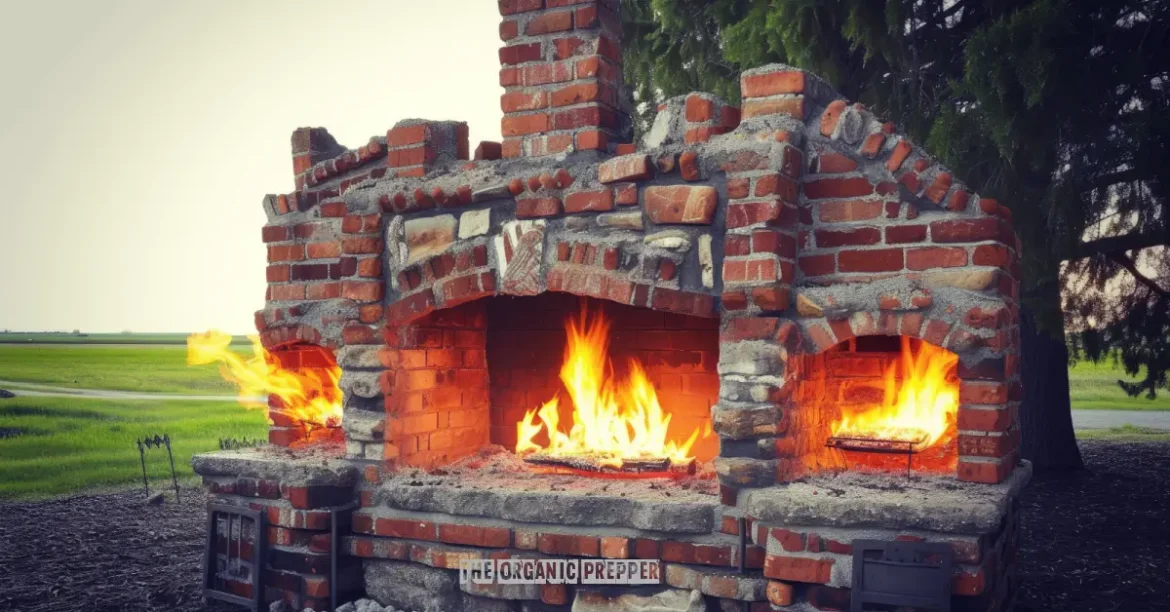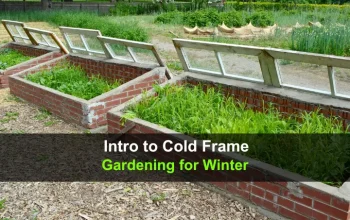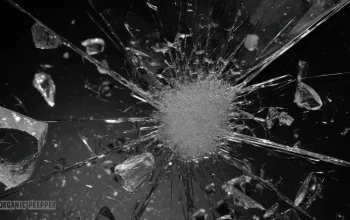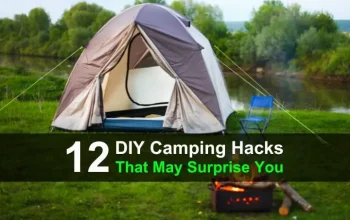(Psst: The FTC wants me to remind you that this website contains affiliate links. That means if you make a purchase from a link you click on, I might receive a small commission. This does not increase the price you’ll pay for that item nor does it decrease the awesomeness of the item. ~ Daisy)
Missed the other parts? Find them here:
Dear Diary,
It’s me, Jessica.
Dad has made about half a dozen different draft drawings of his outdoor oven and stove. As soon as he was done with one drawing, he set it aside and started another, using the previous one as a guide.
Like our home, the abandoned house next door was made of red brick. Rather than trying to bring back red brick from the hardware store in town, Dad is going to use a big sledgehammer to break down a wall or two and salvage the brick to make his outdoor oven and stove. If he has to, he has stone chisels to chip away any excess mortar.
He designed the oven and stove with two different fireboxes. One would heat the oven, and two of the stove top cast iron “burners” big enough for up to a twelve-inch round pan. The second firebox would be large enough to heat four twelve-inch round pans on cast iron “burners” and a large cast iron “grill” big enough to roast half a hog, goat, or lamb. All of the burners and the grill would lift out for cleaning.
The oven itself would be lined with fire brick, and the floor of the oven above the firebox would be a double layer of unglazed tile. Dad designed the firebox to heat the stove but route the smoke out behind and above the oven. Mom did not want “smoked” bread. She said if he wanted to “smoke” anything, he could build a separate smokehouse.
Dad just nodded. He could use the second fire box to smoke either “hot” or “cold” smoke, but he already had ideas for using old refrigerators and making them into “cold” smoke boxes.
One morning working at the Miller’s, Mr. Miller, Dad, Billy, and Justin dug a pit nine feet long, five feet wide, and five feet deep.
Olive, Daisy, and I kept the dirt they shoveled out from falling back into the pit and to the side of the pit.
After a well-deserved break and lunch, Mr. Miller and Dad got a fire going in the bottom of the pit. While they were doing that, the rest of us broke up tree branches of different sizes to put on the fire. Then, we used handheld hatches to split up small hardwood logs about one to two feet in length and four to eight inches in width to add to the fire. Once the fire was really going, we just tossed in the small hardwood logs and added more to keep the fire going. The pit kept a lot of heat to a limited area, but it was still very hot if you got close.
Mr. Miller and Dad let the fire burn down a bit to thick bed of red hot coals, then added more small logs. Once those took, we tossed in as many logs as we could and filled the pit nearly to the top. The logs seemed to almost smother the fire, but after fifteen or twenty minutes, flames reached the top of the pit and the heat increased. The logs at the top began to burn, Dad, Mr. Miller, Billy and Justin paired up, with gloves on, they placed metal roofing panels across the pit, over lapping each of the metal roofing panels over the next one. Once the pit was totally covered with the roofing panels, we shoveled a thick layer of dirt around the edges of the metal to keep air out.
In four or five days of slow burn without oxygen, Dad said we should have about a hundred pounds of charcoal for cooking with. We would use that in the meantime while he built the outdoor oven and stove. Once he worked out all the kinks and major issues, he would build one for the Millers in trade for food for the winter. Dad thought he had enough supplies to make one, maybe two more after building ours and the Miller’s to trade for. Mr. Miller thought a few of the other farmers might be interested.
Entry two
Rae, Mrs. Miller, Janet, and I all rode on horseback for Four Corners. After many lessons from Billy and a few short trips I have taken, I feel much more comfortable and confident in the saddle. Maybe not as good as Mrs. Miller and Janet, who began ridding nearly after they learned to walk, but I felt I could hold my own.
Rae learned to ride when she volunteered at a troubled youth summer camp for a few years. She then taught teens not only how to ride but also how to care for horses.
“Honey,” she said in her deep southern accent, “It is like riding a bicycle. Once you learn, you never forget.”
Tom and Collins and two others were manning the East gate and pulled aside the gate to let us pass. Tom gave one of his flourishing bows, ball cap swept to one side, and said,
“Ladies! Lovely of you to grace us poor, wretched souls with the presence of your ever-so beauty on such a lovely day,” he said in a very bad, fake English accent.
“Tom,” Collins said deadpan, “Will you please shut up with the accent?”
Tom immediately straightened up with feigned indignation,
“Sir! You insult me and my standing! I shall challenge you to a duel of pistols at dawn!”
“Tom, your standing is as a gate guard, you are crap with a pistol, and everyone knows it,” Collins pointed out.
Tom dropped the fake English accent and said flatly, “Yeah, there is that,” and put his ball cap back on.
“Honey,” Rae said as she rode past Tom, “I would of put my money down on you.” And gave him a wink.
“Oh! Now you tell me!”
We rode up to Sean. He strummed his banjo, leaning up against his log, but he had a few logs around him for people to sit on in conversation with him. He set up a picket line behind him to tether horses.
Rae made introductions, as this was Mrs. Miller and Janet’s first trip to Four Corners. Both Mrs. Miller and Janet sat down to talk with Sean at length concerning bringing in crops and livestock to the market for trade with the farmers and about the school. We tied the horses to the picket line and gave them some feed and water.
While Mrs. Miller and Janet talked with Sean, Rae and I walked about Four Corners.
It was still early in the morning, the market was not nearly as crowded as it had been when I delivered the antibiotics to Savannah. Some people had already set up for trade, while others were just arriving. By some unspoken agreement, everyone had their own area. What they did with it was up to them. But there were also a few open spots or stalls that people who only came once or twice a week could use. Others just walked around and traded on foot.
An older couple had ducks, chickens, and eggs to trade for, but they only traded for live animals. It was on the buyer to slaughter and process them.
A younger couple with two children had set up an outdoor grill across from the older couple. I could smell them grilling onions and peppers over a large fire pit. The young woman was beating some eggs in a bowl and handed it to her husband. He poured the eggs over the onions and peppers in a cast iron skillet. We had already eaten breakfast, but it smelled fantastic! After a few moments of cooking and stirring, he poured the eggs into a bowl and handed the bowl to a man who stood waiting with a small wagon filled with vegetables of various kinds. I am guessing he traded some of his vegetables for breakfast. They also had a metal tripod with a large cast iron Dutch oven hanging over the fire, slow-cooking something.
In a stall next door, three women were processing raw wool into socks. One young lady was carding the raw wool. Another was then spinning the wool into yarn. An older woman was knitting a pair of socks as she rocked in a wooden rocking chair. She smiled warmly as we passed.
The couple who ran the barber shop had traded for goat milk and lye soap.
Rae and I could not help ourselves. We traded cured and smoked bacon and two pints of freshly picked blackberries for a hot water hair washing with goat soap and a haircut.
It was heavenly.
I have not felt that clean in . . . well, Diary, I have no idea. And they took off a good four inches of hair off both Rae and me to get us back to more ‘normal’ ponytail lengths. Diary, let me tell you, it was well spent for the bacon and berries.
Entry three
Someone has been stealing from our gardens.
Not just ours.
Everyone’s gardens.
It was subtle enough that we did not really notice until they began stealing corn as it was beginning to ripen.
Then, it was too obvious. If it were deer, they would have at it and not try to hide it.
We had planted corn on both our front lawn and the abandoned house’s front lawn, too. There was enough to not only feed us but for trade at the market. Most people in the community had their own plots of corn of different sizes. Jack was not a big fan of corn but would use his to make moonshine, or what he called a “industrial strength cleaner.”
We spread the word through the community so that everyone could keep an eye out for anything unusual. Whoever it was, they would only come every few nights. Jack guessed they were close, but far enough, if they had a fire, we would not smell it.
A few days later, Mom found footprints in the dirt between a row of corn. She sent me to get Jack. After listening to what I had to report, Jack got his rifle, put on his drop leg hostler and pistol, donned his backpack, and called for Samson to join us.
When Jack, Samson, and I returned to our house, Mom was across the street, talking with Joanna and Sam. They, too, had found footprints in their garden. Jack closely examined both sets. He found another set we had missed. He surmised there were at least three people. One was definitely male, and the other two were either female or youngsters based on the size of the prints and the length of their strides.
Jack went back to the set of prints in our corn row, pointed, and said to the big dog, “Samson, track.”
Diary, it was strange to see Samson’s entire demeanor change like that. Usually, he was a great big, goofy dog. Smart but goofy. Now, he seemed to be all business. He sniffed the print a few times, then nose down, he began to walk in circles till he seemed to find something. At a quick walk, which was nearly a run for Jack and me, we followed the big dog down the street towards the dead end and the woods beyond. Samson slowed to a regular walk, thankfully, but remained focused. We could see he was following a trail through the woods and brush. After about a mile, Samson slowed and then stopped, looking up. We could hear voices. Jack and I both crouched down. He placed one hand on Samson’s neck and said, “Good boy. Easy.”
At a slow, low crouch we moved forward to find a small camp in a clearing. A large tent set back from a fire, and a smaller one next to it. There were three men, two women and three teenagers sitting on camp chairs and on a fallen log. The men had handguns in hostlers on their hips, rifles were leaning up against the log next to the teens.
Jack gave me a glance, and I knew what he had in mind. He then stood up, aiming his rifle, and, at a quick walk, walked into the camp, me following, aiming my rifle, Samson bringing up the rear.
One of the men stood up and went for his handgun when Jack warned, “Do it and die!”
Pointing his rifle right at the man, the man froze with his hand halfway to his gun. No one moved. The tension in the air could be cut with a butter knife.
“We outnumber you,” the man said.
“I can change those odds in less than three seconds, starting with you,” Jack responded.
One of the teens shifted on the log toward the rifles. I aimed my rifle right at his head.
“Go for it, honey,” I surprised myself with my best Rae Southern accent imitation. “You would not be the first person I shot and killed.”
Uncertainty filled his eyes.
“Okay,” the man said and raised his hands. “Let’s calm down and talk.”
“You have been stealing from us. From our gardens. You got till tomorrow at noon to clear out and move on, or I will come back with a platoon of armed militia, and then we do this the hard way, and it will not end well for you.”
“Hey, listen-”
“Tomorrow! Noon!” Jack barked. Samson growled, showing his teeth. “Now, turn around and put your hands on your head, get on your knees, and cross your ankles.” The men did. The women remained in their chairs, hands up. I swept my rifle over the teens on the log, stopping with the boy with uncertain eyes now filled with fear.
“Back,” Jack said quietly, and we walked backward slowly, keeping our rifles on them. Samson seemed to know what was going on and trotted down the trail. Once we were out of sight, Jack said, “Run.”
We made it back to the neighborhood without any sign of pursuit. Once we were sure we were safe, Jack looked over at me as we walked down the street,
“Go for it, honey?”
I shrugged. “It sounded good at the time.”
Jack ordered what he called an “LP/OP” or Listening Post/Observation Post hidden to one side of the trail and a few others around the community, three of the militia to each LP/OP to stand watch. It was going to be a long night for some of us. Tomorrow, the entire militia would do a sweep of the area to see if they had, in fact, left. Jack was considering the idea of a night watch patrol for the neighborhood.
Diary, I am not going to lie, the idea of shooting people who are just trying to feed themselves, I was a little uncomfortable with. But at the same time, they were stealing food from us. We need that food to feed ourselves. They did not do the work to grow that food. They just took.
Diary, I am not sure how I feel about that.
About 1stMarineJarHead
1stMarineJarHead is not only a former Marine, but also a former EMT-B, Wilderness EMT (courtesy of NOLS), and volunteer firefighter.
He currently resides in the great white (i.e. snowy) Northeast with his wife and dogs. He raises chickens, rabbits, goats, occasionally hogs, cows and sometimes ducks. He grows various veggies and has a weird fondness for rutabagas. He enjoys reading, writing, cooking from scratch, making charcuterie, target shooting, and is currently expanding his woodworking skills.



